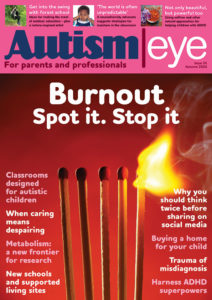Some young adults who were bullied as a child could have a greater risk of ongoing depression, according to a study.
In work that has important findings for the autism community, in which bullying is rife, researchers looked for factors influencing depression in individuals from the ages of 10 to 24.
 They found that genetic and environmental factors were involved.
They found that genetic and environmental factors were involved.
In particular, they discovered that childhood bullying was strongly associated with trajectories of depression that rise at an early age.
Information from 3,325 teenagers
The researchers were from the University of Bristol. They used detailed mood and feelings questionnaires and genetic information from 3,325 teenagers.

Researcher Alex Kwong: “Although we know that depression can strike first during the teenage years, we didn’t know how risk factors influenced change over time”
The teenagers are part of Children of the 90s, also known as the Avon Longitudinal Study of Parents and Children (ALSPAC).
This a long-term health research project that enrolled more than 14,000 pregnant women in 1991 and 1992.
It has been following the health and development of the parents, their children and now their grandchildren in detail ever since.
Depression risk factors
One of the researchers was Alex Kwong, a PhD student at the University of Bristol. He said: “Although we know that depression can strike first during the teenage years, we didn’t know how risk factors influenced change over time.
“Thanks to the Children of the 90s study, we were able to examine at multiple time points the relationships between the strongest risk factors, such as bullying and maternal depression, as well as factors such as genetic liability.”
Genetic liability and family risk
He added: “It’s important that we know if some children are more at risk of depression long after any childhood bullying has occurred. Our study found that young adults who were bullied as children were eight times more likely to experience depression that was limited to childhood.
“However, some children who were bullied showed greater patterns of depression that continued into adulthood and this group of children also showed genetic liability and family risk.”
According to Kwong: “The next steps should continue to look at both genetic and environmental risk factors to help untangle this complex relationship that would eventually help influence prevention and coping strategies for our health and education services.”
Early intervention
Dr Rebecca Pearson is a lecturer in psychiatric epidemiology at the University of Bristol. She said: “The results can help us to identify which groups of children are most likely to suffer ongoing symptoms of depression into adulthood and which children will recover across adolescence.
For example, the results suggest that children with multiple risk factors (including family history and bullying) should be targeted for early intervention but that when risk factors such as bullying occur in insolation, symptoms of depression may be less likely to persist.”
Click here to see the research paper.
Related:
- Calls for action on health and bullying
- The 2019 National Neurodiversity and Mental Health Conference
- Revealed: serious victimisation of girls
- Scandal of child mental health spending
- Call to educate young to stop hate crime
Published: 27 September 2019
















